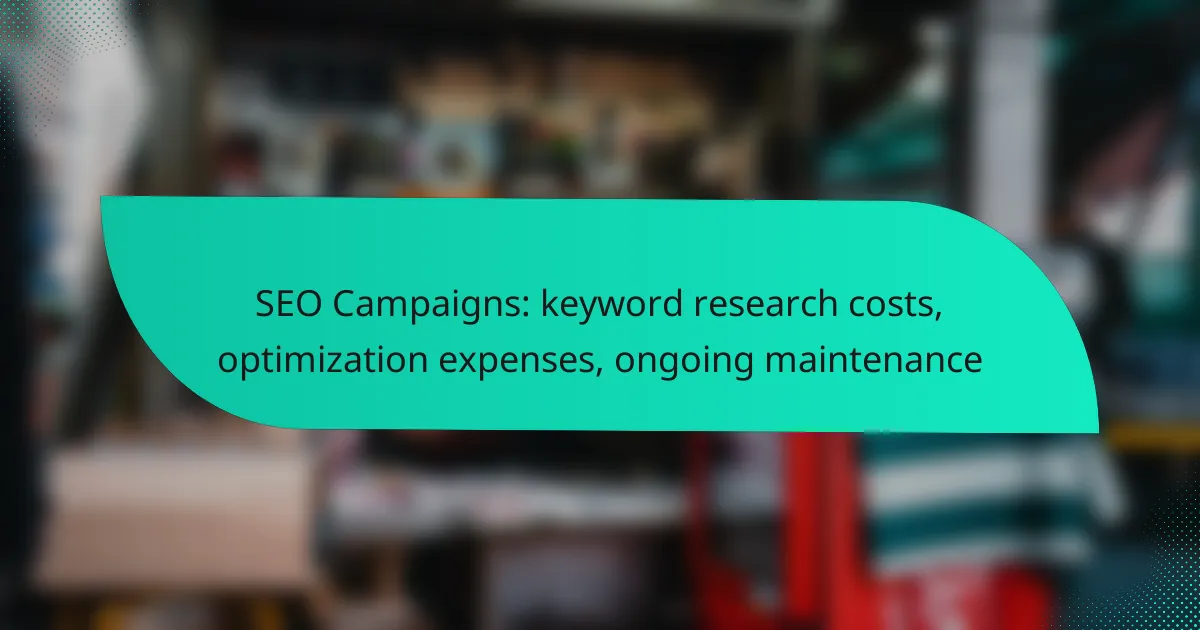Understanding the costs associated with SEO campaigns is crucial for businesses looking to enhance their online presence. Expenses for keyword research, optimization, and ongoing maintenance can vary widely, influenced by project complexity and specific needs. Typically, businesses may spend from a few hundred to several thousand pounds or dollars, depending on the services required and the expertise of the agency involved.

What are the costs of SEO keyword research in the UK?
The costs of SEO keyword research in the UK can vary significantly based on the service provider and the complexity of the project. Typically, businesses can expect to pay anywhere from a few hundred to several thousand pounds, depending on their specific needs and goals.
Average costs for keyword research services
On average, professional keyword research services in the UK range from £200 to £1,500. Freelancers may charge lower rates, often starting around £100 for basic research, while established agencies may command higher fees for comprehensive analyses. Some services may offer packages that include additional SEO strategies, which can increase overall costs.
For ongoing keyword tracking and updates, businesses might pay a monthly fee, which can range from £50 to £300, depending on the level of service and frequency of updates required.
Factors influencing keyword research pricing
The experience and reputation of the service provider also impact pricing. Established firms with a proven track record may charge more due to their expertise and the quality of insights they provide.
Comparison of DIY vs. professional services
Conducting keyword research yourself can save money, especially for small businesses or startups. Free tools like Google Keyword Planner and Ubersuggest can provide valuable insights without any cost. However, DIY research may lack the depth and strategic context that professional services offer.
Professional services, while more expensive, typically provide a comprehensive analysis that includes competitor insights, search intent, and long-tail keyword opportunities. This can lead to more effective SEO strategies and better long-term results, making it a worthwhile investment for many businesses.

What are the optimization expenses for SEO campaigns?
Optimization expenses for SEO campaigns can vary significantly based on the scope and complexity of the project. Key costs include on-page optimization, technical SEO improvements, and content creation, each contributing to the overall effectiveness of the campaign.
Typical costs for on-page optimization
On-page optimization typically involves adjusting elements on your website to improve search engine rankings. Costs can range from a few hundred to several thousand dollars, depending on the size of the site and the depth of the optimization required.
Common on-page tasks include keyword optimization, meta tag adjustments, and improving site structure. Hiring an SEO specialist or agency may incur hourly rates or project-based fees, so it’s essential to evaluate your specific needs before budgeting.
Budgeting for technical SEO improvements
Technical SEO improvements focus on enhancing the backend of your website to ensure it meets search engine standards. Expenses can vary widely, often falling between a few hundred to several thousand dollars, depending on the issues identified.
Key areas to consider include site speed optimization, mobile responsiveness, and fixing crawl errors. Investing in these improvements can lead to better user experience and higher search rankings, making it a crucial part of your SEO budget.
Costs associated with content creation and updates
Content creation and updates are vital for maintaining relevance and authority in search results. Costs can range from low hundreds to several thousand dollars per piece, depending on the quality and expertise required.
Consider factors like the type of content (blog posts, infographics, videos) and frequency of updates when budgeting. Regularly refreshing your content can enhance engagement and improve SEO performance, making it a worthwhile investment.

How much does ongoing SEO maintenance cost?
Ongoing SEO maintenance costs can vary significantly based on the services required and the agency’s expertise. Typically, businesses can expect to pay anywhere from a few hundred to several thousand dollars per month, depending on their specific needs and goals.
Monthly retainer fees for SEO agencies
Monthly retainer fees for SEO agencies generally range from $500 to $5,000. Smaller businesses may find packages in the lower range, while larger enterprises or those in competitive industries might need to invest more for comprehensive services. It’s crucial to evaluate what services are included in these retainers, such as keyword tracking, content updates, and technical SEO support.
When selecting an agency, consider their track record, client reviews, and the specific strategies they propose. A well-structured retainer can provide ongoing support and adjustments based on performance metrics.
Cost breakdown of regular SEO audits
Regular SEO audits typically cost between $300 and $1,500, depending on the complexity of the website and the depth of the audit. These audits assess various factors, including site structure, keyword usage, and backlink profiles. Conducting audits regularly helps identify areas for improvement and ensures that the SEO strategy remains effective.
It’s advisable to schedule audits at least quarterly, as this frequency allows for timely adjustments to the SEO strategy based on changing algorithms and market conditions. Some agencies may include audits in their monthly retainer, so clarify this aspect when negotiating contracts.
Impact of competition on maintenance costs
The level of competition in your industry significantly influences ongoing SEO maintenance costs. In highly competitive markets, businesses may need to invest more in SEO to maintain visibility and rankings. This could mean higher retainer fees or more frequent audits to stay ahead of competitors.
To gauge the impact of competition, analyze your industry’s landscape and benchmark against competitors’ online presence. If competitors are heavily investing in SEO, consider increasing your budget to ensure your website remains competitive in search engine results.

What factors should be considered when budgeting for SEO?
When budgeting for SEO, consider the costs associated with keyword research, optimization, and ongoing maintenance. Each of these components plays a crucial role in the overall effectiveness and sustainability of your SEO strategy.
Determining ROI for SEO investments
To determine the return on investment (ROI) for SEO, assess how much revenue your SEO efforts generate compared to the costs incurred. This involves tracking metrics such as organic traffic growth, conversion rates, and average order value.
For example, if your monthly SEO expenses total around $1,000 and you see a revenue increase of $5,000 attributed to organic search, your ROI would be significant. Regularly review these metrics to ensure your SEO strategy remains profitable.
Setting realistic expectations for SEO results
Setting realistic expectations for SEO results is essential for long-term success. SEO is not an overnight solution; it typically takes several months to see significant improvements in rankings and traffic. Factors such as competition, industry, and the current state of your website can influence timelines.
A common heuristic is to expect noticeable results within 3 to 6 months, but this can vary widely. Focus on incremental improvements and adjust your strategies based on performance data to maintain momentum and achieve your goals effectively.

How do SEO costs vary by industry in the UK?
SEO costs in the UK can differ significantly across various industries due to factors like competition, target audience, and the complexity of services offered. Businesses in highly competitive sectors often face higher expenses for keyword research, optimization, and ongoing maintenance compared to those in niche markets.
Industry-specific SEO pricing trends
In the UK, industries such as finance, legal, and e-commerce typically incur higher SEO costs due to intense competition and the need for specialized knowledge. For instance, SEO services in the finance sector can range from £1,000 to £5,000 per month, while less competitive industries might see costs between £300 and £1,500 monthly.
Conversely, sectors like local services or small businesses may benefit from more affordable SEO packages, often priced between £200 and £800 monthly. Understanding these trends helps businesses allocate their budgets effectively based on their industry landscape.
Case studies of SEO costs in different sectors
A case study in the e-commerce sector revealed that a mid-sized online retailer invested around £3,000 monthly in SEO services, focusing on extensive keyword research and on-page optimization. This investment resulted in a significant increase in organic traffic and sales over a six-month period.
In contrast, a local plumbing company spent approximately £500 monthly on SEO, targeting specific geographic keywords. This strategy led to a noticeable improvement in local search rankings and an increase in customer inquiries. These examples illustrate how SEO costs can be tailored to meet the unique needs of different sectors while achieving measurable results.

What are the emerging trends in SEO budgeting?
Emerging trends in SEO budgeting reflect a shift towards more dynamic and technology-driven strategies. Businesses are increasingly allocating funds to advanced tools and services that enhance efficiency and effectiveness in their SEO campaigns.
Impact of AI tools on SEO costs
AI tools are significantly influencing SEO costs by automating various tasks such as keyword research, content optimization, and performance analysis. These tools can reduce labor hours, but they often come with subscription fees that can range from low tens of USD to several hundred USD monthly, depending on the features offered.
While initial investments in AI tools may seem high, they can lead to long-term savings by streamlining processes and improving outcomes. Companies should evaluate the return on investment (ROI) by comparing the costs of these tools against the potential increase in traffic and conversions.
Future predictions for SEO service pricing
Future predictions suggest that SEO service pricing will continue to evolve, with a trend towards more performance-based models. This means that agencies may charge based on the results they deliver, such as increased rankings or traffic, rather than fixed monthly fees.
As competition increases, agencies may also offer tiered pricing structures to accommodate businesses of various sizes. Small to medium enterprises (SMEs) might expect to pay anywhere from a few hundred to a few thousand USD monthly, while larger corporations could face significantly higher costs based on their needs.
Shifts in SEO investment strategies post-pandemic
Post-pandemic, many businesses have shifted their SEO investment strategies to prioritize digital presence and online engagement. This includes reallocating budgets towards content creation, local SEO, and user experience optimization to meet changing consumer behaviors.
Companies are also focusing on long-term SEO strategies rather than short-term gains, recognizing the importance of sustainable growth. Investing in high-quality content and technical SEO can yield better results over time, making it essential to balance immediate needs with future goals.
